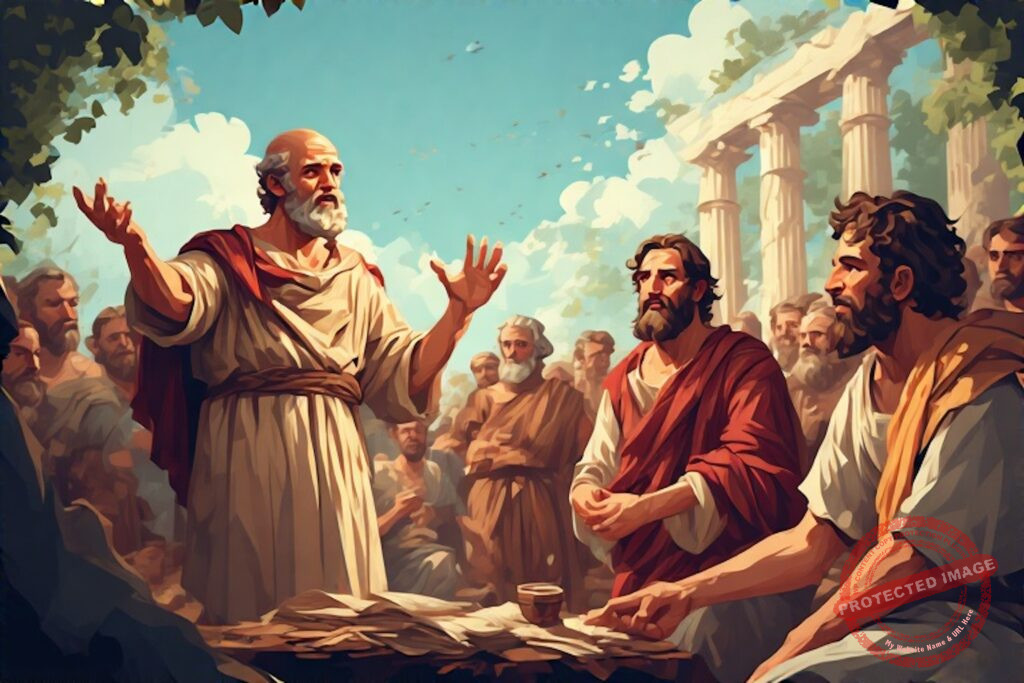
The Apostle Paul planting seeds of faith among non-believers in Greece.
I often find myself reflecting on the different journeys people take when it comes to belief. Many of my friends and family don’t share my conviction that Jesus is the Messiah or even that the God of the Bible is real. I can understand that, because for the first fifty years of my life I felt the same way. Yet now, having experienced the hope and transformation that faith in Christ brings, I feel a deep desire to quietly plant seeds of faith—small glimpses of the truth that has changed me—in the lives of those I love. These are good and generous people, raising families, working hard, and living with kindness. I see their goodness as a blessing, and I also hope they might one day know the deeper source of life and truth that flows from God Himself.
The Role of the Believer: Faithful Witnessing
The apostle Paul shared a similar burden when he wrote in Romans 9:2-3: “I have great sorrow and unceasing anguish in my heart. For I could wish that I myself were cursed and cut off from Christ for the sake of my people, those of my own race.” Paul’s love for his fellow Israelites didn’t stop at sorrow; it moved him to action through prayer, preaching, and patient endurance. Like Paul, believers today have a role—not to force faith, but to be a faithful witness, planting seeds of faith through compassion, relationship, and Scripture.
One of the most impactful things we can do is pray. We can ask the Lord to soften the hearts of those around us, to open spiritual eyes, and to give us opportunities to share—not through judgment or confrontation, but through connection. A quiet word at the right moment, a verse gently spoken, or an act of kindness can speak volumes.
Sharing the God of the Bible
A major gap today lies in how people perceive God. If they recognize a higher power at all, it is limited to a general idea, a cultural heritage, or a distant force (like ‘The Force’ as described in the movie Star Wars!) But the God of the Bible is anything but abstract. He is the One who revealed Himself to Moses in the burning bush (Exodus 3:14), saying, “I AM WHO I AM.” He is the One who makes and keeps covenants, who thunders from Sinai and whispers to Elijah. He is personal, powerful, and present.
Psalm 111:10 declares, “The fear of the Lord is the beginning of wisdom; all who follow his precepts have good understanding.” To fear the Lord is not to tremble with dread but to stand in reverent awe of His holiness, His justice, and His mercy. Sharing this understanding of God—through our lives, words, and prayers—is a way to plant seeds of faith in a culture that often prefers spiritual generalities over biblical specificity.
Why Bother Trying to Fix What’s Not Broken?
I often ask myself, If my secular friends and family seem to be thriving already, why would I want to lead them toward God? On the surface, their lives look full—successful careers, loving families, and meaningful routines. Yet I’ve come to see that looks can be deceiving. Beneath the surface, there can still be quiet fears, unspoken anxieties, or a lingering sense that something vital is missing. When life revolves only around ourselves, without the grounding presence of God, even our best pursuits can leave us unsatisfied. That’s why I feel called, not to preach or push, but to gently plant seeds of faith—small reminders of God’s love—so they might discover for themselves the deeper hope He offers.
Secondly, the Bible is clear. The only way to obtain eternal life is through putting our faith in the Son of God. Now while eternity may not seem like a pressing issue when we’re busy with our lives, the fact is that eternity is everything. Life on earth comes and goes quickly. The experiences we have now are precious, for sure, but they can’t compare to what God has planned for us in His heavenly house. As David so eloquently reflected in Psalm 23:6, “Surely goodness and mercy shall follow me all the days of my life, and I shall dwell in the house of the Lord forever.”
Jesus: The Fulfillment of the Promise
Many secular Americans reject the idea that Jesus is the Messiah. In our modern culture, belief demands proof. And we cannot prove that Jesus performed miracles and rose from the dead. We did not see it. We rely on biblical accounts from others who were there. Consider Isaiah 53, where the prophet describes the suffering servant: “He was pierced for our transgressions, he was crushed for our iniquities… and by his wounds we are healed” (Isaiah 53:5). Most people are unfamiliar with this passage, yet it speaks clearly of the atoning sacrifice of Jesus.
Jeremiah 31:31 also lays the foundation for the new covenant: “The days are coming,” declares the Lord, “when I will make a new covenant with the people of Israel and with the people of Judah.” This covenant, written on our hearts, was fulfilled through Jesus. He is not a break from Judaism but its fulfillment—the Messiah promised by the prophets.
Zechariah 12:10 gives a haunting preview of this moment of recognition: “They will look on me, the one they have pierced, and they will mourn for him as one mourns for an only child.” There will come a time of revelation, but until then, our calling is to bear witness.
Why Should We Believe the Bible?
A skeptic will say, ‘Yes, the Bible makes clear reference to a Messiah, and Jesus seems to fulfill all that was prophesied. But the Bible is just a fabrication of men’s minds, not the word of God.’ What is this conclusion based on? Their opinion? Their gut sense? What their teachers or parents told them? The Bible is the oldest, most recognized book in the history of civilization. Why is that? Why has it had so much influence in people’s lives over the past three thousand years? And what have two billion Christians and Jews found worthy in its pages all this time? Superstitions are fickle – they come and go. What if the Bible actually speaks the truth?
And if that’s the case, then what are the implications if we choose to ignore its teachings? God says that if we believe in Him, He will bless our lives and give us eternal life. Yet, if we make other things more important than Him, our lives will be filled with hardship and we will cease to exist after our short stay on earth. The secular world ‘thinks’ the Bible is fabricated. What is their proof? How can they be so sure that God does not exist?
Today Most People’s Faith is in Science, Not God
I find it amusing that my secular friends and family believe without doubt certain scientific theories that clearly lack definitive proof. Two such examples are the Big Bang and evolution. In their mind, the universe started with the Big Bang. Why? Because that’s what our scientists tell us. Yet, where is the definitive proof? Show me a picture. There is not absolute proof that the universe started at the Big Bang in the sense of mathematical certainty. Rather, scientific evidence supports the Big Bang as the best current explanation for the origin of the observable universe. Five hundred years ago scientific evidence supported the notion that the earth was flat. So much for ‘truth’.
The same holds for huge gaps in the theory of evolution. Even the most devoted fan of Darwin cannot explain how 90% of all complex life evolved within a short historical span called the Cambrian Explosion. This was an evolutionary period that occurred approximately 540 million years ago. During this time, life on Earth underwent an unprecedented burst of diversification, with most major animal groups appearing in a relatively short geological span of about 20–25 million years. This discovery contradicts Darwin’s key proposition that life evolved through small, incremental changes over long periods. Evolution is not a fact, it’s our current scientific theory of how life came about. Yet we teach it in school to our children as absolute truth and treat it as gospel.
Who Are We Worshiping?
People today have put their faith in unproven scientific theories. In a sense, they are bowing down and worshiping these beliefs, holding them as ultimate truth. We believers, on the other hand, put our faith in God as described in the Bible. God warned about worshiping idols and false gods. The first commandment in Deuteronomy 5:7-10 clearly states: “You shall have no other gods before me. You shall not make for yourself a carved image, or any likeness of anything that is in heaven above, or that is on the earth beneath, or that is in the water under the earth. You shall not bow down to them or serve them; for I the Lord your God am a jealous God, visiting the iniquity of the fathers on the children to the third and fourth generation of those who hate me, but showing steadfast love to thousands of those who love me and keep my commandments.”
There Are Consequences for our Choices and Actions
Scripture is clear that our choices have real consequences—especially when it comes to who or what we worship. From the earliest pages of the Bible, God warns His people that turning to false gods leads to judgment and loss. Here are some passages that powerfully affirm this truth:
Deuteronomy 11:26–28
“See, I am setting before you today a blessing and a curse—the blessing if you obey the commands of the Lord your God that I am giving you today; the curse if you disobey the commands of the Lord your God and turn from the way that I command you today by following other gods, which you have not known.”
This is one of the clearest statements that God gives people a choice—with real consequences. Faithfulness brings blessing. Idolatry brings a curse.
Jeremiah 2:13
“My people have committed two sins: They have forsaken me, the spring of living water, and have dug their own cisterns, broken cisterns that cannot hold water.”
Here, God laments that His people turned from Him to things that cannot satisfy. This spiritual betrayal leads to judgment and exile. Choosing false gods leads to brokenness.
Faith in God is not a Panacea
Our lives as believers are far from perfect. We struggle with fears and anxieties like everyone else. But there is a difference. In the midst of challenges, we know that we are not alone, that there is a God looking out for us. He may not deliver us the way we want, or in the timing we choose, but He will always do what is best for us. This faith serves as a hedge of protection for our hearts and minds as we live day-to-day.
Last year, a close friend succumbed to cancer. She was only forty-five years old. It was painful process. But during the entire ordeal, during her fight to survive, she knew that God was ultimately in charge and had her best interest in mind. Her unwavering belief gave her comfort, even though her situation was so incredibly difficult. Her faith was an inspiration to me.
I have another friend who also went through cancer. Thankfully, she survived and is now healthy again. During her treatment, I was shocked at how calm she was. Her siblings chastised her, telling her that she needed to be more concerned about her situation. She laughed and said, “Why? God’s got this!” Most believers don’t have the kind of faith that my friend has. But it’s something we can aspire to. She is certainly another roll model for me.
Our Part and God’s Power
Ultimately, it is not our persuasive arguments or perfect timing that changes hearts. 2 Corinthians 4:6 reminds us: “For God, who said, ‘Let light shine out of darkness,’ made his light shine in our hearts to give us the light of the knowledge of God’s glory displayed in the face of Christ.” Our part is obedience. His part is transformation.
Even when it feels impossible—when their resistance is strong or indifference is deep—keep planting seeds of faith. Keep praying. Keep loving. Keep sharing truth gently, patiently, and without expectation. Trust the Gardener to bring the harvest.
Call to Action: Join the Conversation
If you’ve ever struggled with how to talk about your faith with non-believing friends and family, you’re not alone. Have you had opportunities to plant seeds of faith—even small ones? Or are you still praying for an open door? Share your experience in the comments below. Let’s encourage each other and trust that God is still writing stories of redemption—one seed at a time.
About Raleigh Acupuncture
At Raleigh Acupuncture Associates, we are deeply committed to providing the highest quality professional acupuncture while being rooted in strong Judeo-Christian values of love, faith, kindness, and truth. We guide our practice with compassionate care, where each patient is treated with respect and dignity, regardless of their background, faith, or beliefs. We welcome people from all walks of life and strive to create a warm, inclusive environment promoting healing and holistic wellness. Our dedication to delivering exceptional acupuncture is paired with a genuine love for helping others, making our clinic a place where faith and professional medical care come together for the well-being of every patient.
Next Steps
BOOK NOW to schedule an appointment online.
Meet Our Practitioners (Video).
Learn about all the conditions we treat.
Focus Keyphrase: seeds of faith
Image generated with https://perchance.org/ai-text-to-image-generator





Leave a Reply